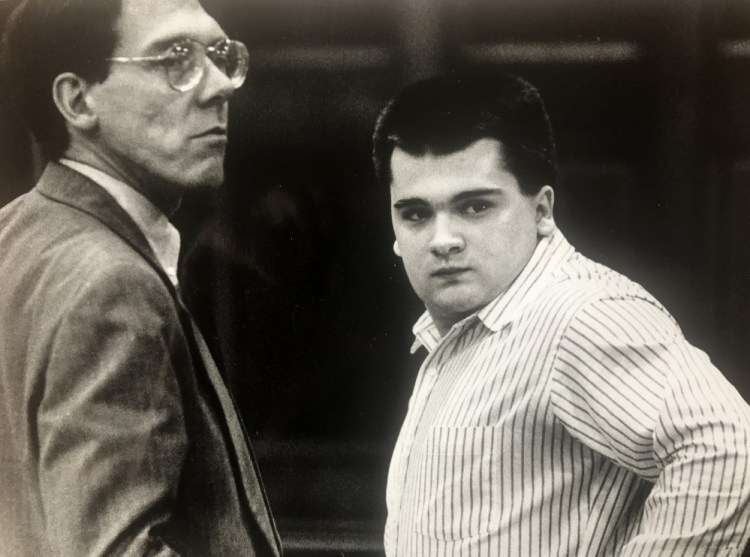The Maine Attorney General’s Office has asked a judge to dismiss allegations brought by Anthony H. Sanborn Jr. that police and prosecutors acted improperly during the investigation and trial that led to his 1992 conviction for murder.
In a 27-page response filed Monday, Assistant Attorney General Paul Rucha rebutted numerous allegations raised since January by Sanborn’s attorney, Amy Fairfield. Rucha argued that some of the allegations were long known to attorneys, and therefore did not constitute new information and should be dismissed. In other instances, Rucha argued, his office did not have enough specific information about allegations made by Fairfield to fully prepare for several days of hearings scheduled for July and August, and she should provide more details.
Rucha also broadly denied one of the main arguments of Sanborn’s case, that police improperly withheld evidence they knew would have been helpful to him at trial.
Monday’s filing is the state’s first detailed response to the wide-ranging and numerous allegations made by Fairfield in several court filings alleging that Sanborn was wrongly convicted, and that a former state prosecutor and two Portland police detectives coerced and threatened witnesses, suppressed evidence helpful to Sanborn and lied during the trial.
Sanborn, now 44, was convicted of killing Jessica L. Briggs, who was 16 when she was stabbed to death on the Maine State Pier in May 1989. Her body was found in Portland Harbor. Sanborn, who was also 16 at the time, had briefly dated Briggs a couple of months before her death.
Authorities said Sanborn killed her in a rage after she first refused to travel to Virginia Beach with him, then would not give Sanborn the small amount of tip money she had earned earlier in the night bussing tables at DiMillo’s floating restaurant.
Sanborn has maintained his innocence and denies he had any involvement in the killing.
At the center of the case is Hope Cady, the only person who said she witnessed the killing.
On the witness stand in 1992, Cady said she watched Sanborn from a distance near the Maine State Pier and saw him stab Briggs.
But Cady recanted her testimony at an April 13 hearing in Portland. She told Superior Court Justice Joyce Wheeler that police instructed her how to testify, and they threatened to lock her up if she did not go along with their version of events. She told the judge that she was not even on the pier that night.

Hope Cady testifies on April 13, casting doubt on testimony she gave in 1992 that identified Anthony Sanborn Jr. as 16-year-old Jessica Briggs’ killer.
Fairfield also alleged that the state knew Cady had poor eyesight, and was legally blind when she professed to having witnessed the killing from a distance at night in dim lighting.
But Rucha alleges that there is no documentation dated before the killing in Cady’s extensive, confidential Department of Health and Human Services case file that indicates an eye problem.
“To the extent that (Sanborn) is relying on confidential records that have only recently been disclosed, the (state) denies that there is documentary evidence contained within those records that demonstrate an issue with Cady’s ability to see at distance in 1989,” Rucha wrote. “Similarly, the (state) denies that the prosecution or police had access to those records prior to 1992.”
Rucha also alleges that Cady, who now lives in Augusta, went to police to complain about being harassed by unspecified people connected to Fairfield, and that Fairfield called Cady.
In a brief interview Monday, Fairfield disputed that anyone harassed Cady, who at the time had just been served a subpoena to appear in Cumberland County Superior Court for Sanborn’s bail hearing.
Fairfield said the court had asked her to ensure that Cady showed up for the hearing, and the call and a subsequent meeting Fairfield had with Cady were to explain the court process going forward and arrange for her transportation to Portland and back home to Augusta.

Accompanied by his lawyer, Amy Fairfield, left, Tony Sanborn, 44, cries as it becomes clear that Judge Joyce Wheeler intends to release him on bail during a hearing on April 13.
“The intimation that I had anything to do with Hope Cady recanting her testimony is offensive, is completely false and it smacks of how desperate they are,” Fairfield said. “This is a no-holds-barred attempt to preserve their conviction despite what the truth is.”
According to previously filed court records, an independent journalist, John Rudolf, spoke with Cady, and portions of his interview with her were included in Fairfield’s petition as a basis for her to testify in April. Fairfield said Monday that she tried last summer to interview Cady but was not successful. Cady also has previously declined two requests by the Portland Press Herald for an interview.
When asked about the other aspects of the state’s motion to dismiss, Fairfield said she had not yet reviewed it in detail, but felt a need to respond to the allegations regarding her alleged personal involvement with Cady.
Matt Byrne can be contacted at 791-6303 or at:
mbyrne@pressherald.com
Twitter: MattByrnePPH
Send questions/comments to the editors.




Comments are no longer available on this story